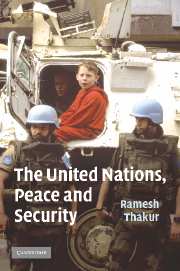Book contents
- Frontmatter
- Contents
- List of figures
- List of tables
- Foreword, Gareth Evans
- Acknowledgements
- Introduction
- PART I An international organisation for keeping the peace
- PART II Soft security perspectives
- PART III Hard security issues
- 7 The nuclear threat
- 8 International terrorism
- 9 Kosovo 1999
- 10 Iraq's challenge to world order
- 11 The responsibility to protect
- 12 Developing countries and the eroding non-intervention norm
- PART IV Institutional developments
- Conclusion: at the crossroads of ideals and reality
- Index
9 - Kosovo 1999
Published online by Cambridge University Press: 24 May 2010
- Frontmatter
- Contents
- List of figures
- List of tables
- Foreword, Gareth Evans
- Acknowledgements
- Introduction
- PART I An international organisation for keeping the peace
- PART II Soft security perspectives
- PART III Hard security issues
- 7 The nuclear threat
- 8 International terrorism
- 9 Kosovo 1999
- 10 Iraq's challenge to world order
- 11 The responsibility to protect
- 12 Developing countries and the eroding non-intervention norm
- PART IV Institutional developments
- Conclusion: at the crossroads of ideals and reality
- Index
Summary
If the Gulf War (1990–1) marked the birth of the new world order, Somalia (1992–4) was the slide into the new world disorder and Rwanda (1994) and Srebrenica (1995) marked the loss of innocence after the end of the Cold War. This background and sequence of events and developments help to explain the forging of a normally elusive political will among the major actors of the Euro-Atlantic alliance when, faced with a compelling humanitarian tragedy in Kosovo, the North Atlantic Treaty Organisation (NATO) launched a ‘humanitarian war’ without UN authorisation. As discussed already in chapter 2, by 1999 Yugoslav President Slobodan Milošević had exhausted their patience. They were determined to confront him if necessary, instead of allowing him to get away with his murderous practices yet again. But the action raised many troubling questions about what we can and should do when faced with a humanitarian tragedy. The triple policy dilemma can be summarised thus:
to respect sovereignty all the time is to be complicit in humanitarian tragedies sometimes;
to argue that the UN Security Council (UNSC) must give its consent to international intervention for humanitarian purposes is to risk policy paralysis by handing over the agenda either to the passivity and apathy of the Council as a whole, or to the most obstructionist member of the Council, including any one of the five permanent members (P5) determined to use the veto clause;
to use force without UN authorisation is to violate international law and undermine world order.
The three propositions together highlight a critical gap between the needs and distress felt in the real world and the codified instruments and modalities for managing world order.
- Type
- Chapter
- Information
- The United Nations, Peace and SecurityFrom Collective Security to the Responsibility to Protect, pp. 203 - 221Publisher: Cambridge University PressPrint publication year: 2006



